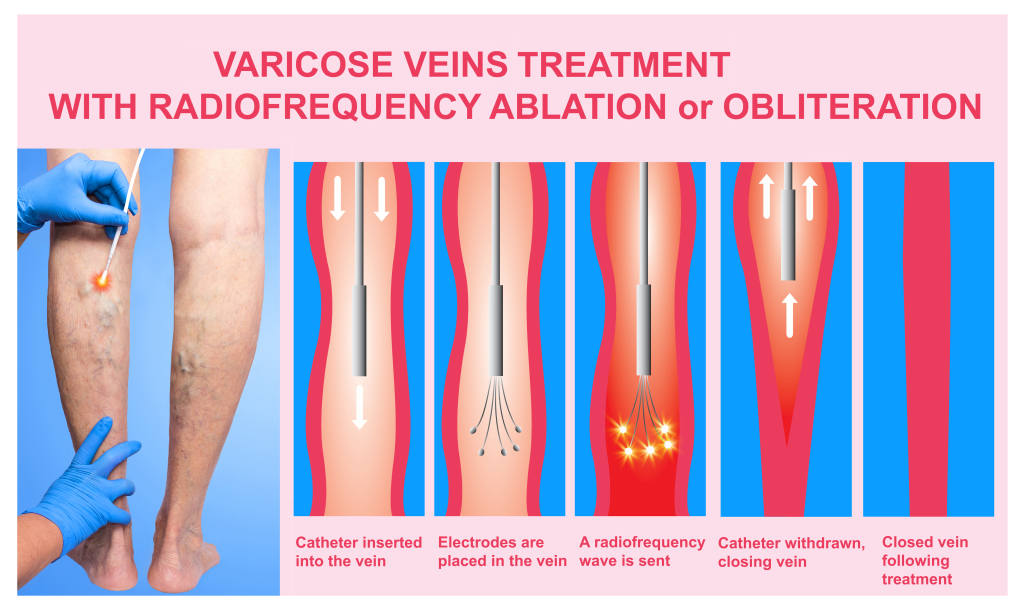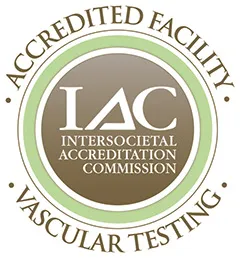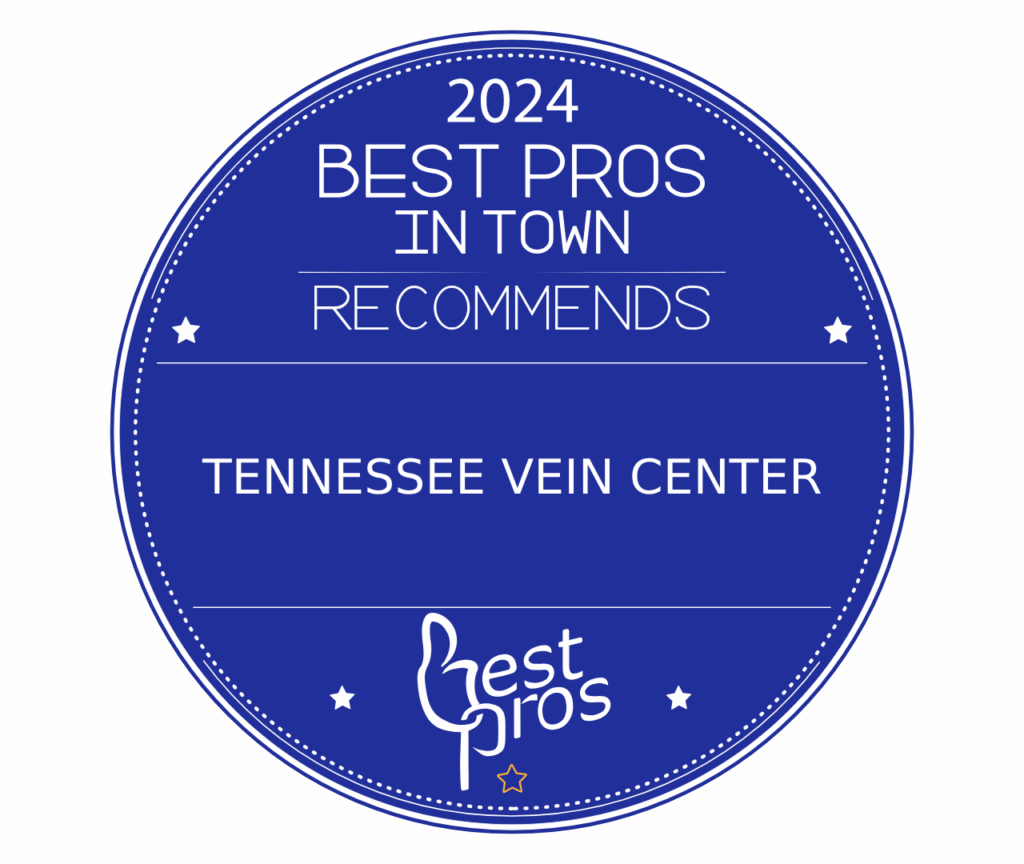endovenous thermal ablation
Vein Services
Understanding Endovenous ThermalAblation
Treatment
Did you know that when blood pools in your veins, they can become damaged, leading to large, rope-like veins that protrude from your skin, known as varicose veins?
Varicose veins affect thousands of people yearly, leading to unrelenting symptoms such as pain, throbbing, swelling, and skin discoloration. If left untreated, they can become a severe medical condition and cause ulcers.
These displeasing veins can be stressful to live with as they can prevent you from wearing your favorite clothing and keep you from showing off your legs.
If you or a loved one suffer from varicose veins, don’t leave them untreated. Instead, choose a minimally invasive treatment option, such as endovenous thermal ablation, to get the relief you need now.
Continue reading to learn more about endovenous ablation.
What is Endovenous Thermal Ablation Treatment?
Endovenous thermal ablation (EVTA) is a minimally invasive ultrasound-guided vein disease treatment for varicose veins, utilizing either laser or radiofrequency energy.
The goal of EVTA is to treat underlying abnormal veins with broken valves.
This in-office treatment is performed with local anesthesia and can rapidly improve any varicose veins or venous insufficiency symptoms.
The energy used during the procedure is delivered through a fine optical fiber inserted into the underlying abnormal vein. It heats the vein at the optical fiber’s tip, causing the abnormal vein to close. Blood is rerouted to the normal functioning veins. With time, the abnormal vein treated by thermal energy is broken down and reabsorbed by the body.
The procedure takes less than one hour, and you can walk out and resume most of your normal daily activities.
The Advantages Of Endovenous Laser Ablation For Varicose Veins
There are various advantages to deciding on an EVTA procedure for your varicose vein care, including:
- No vein stripping – No surgery!
- Immediate return to most normal activities
- It is an in-office procedure – No hospitalization!
- Thermal energy has a 98% success rate
- Walk in and walk out in about an hour!
- Rapid recovery with minimal post-procedure pain
- A nearly pain-free procedure
- Only requires local anesthesia
- The procedure is covered by most medical insurance
- No scalpels, no incisions, and no unsightly scars
Who Is A Good Candidate for Endovenous ThermalAblation?
Endovenous thermal ablation is a suitable vein disease treatment for men and women of any skin tone diagnosed with varicose veins.
The procedure may be ideal for you if you have:
- A confirmed venous insufficiency diagnosis with moderate to severe symptoms.
- Symptomatic varicose veins, including pain, swelling, or discomfort.
- Tried other conservative treatments like compression stockings without success
- Ability to easily walk
Patients who are pregnant or breastfeeding are advised not to consider endovenous ablation.
During your initial consultation with our skilled team, we will assess your condition and health to ensure that endovenous thermal ablation treatment is appropriate for your health needs and wellness goals.
How is an EVTA Procedure Performed?
The first step in evaluating varicose veins or symptoms suggestive of venous insufficiency is to schedule a medical consultation with Tennessee Vein Center.
As part of the consultation, we will determine if a complete evaluation with duplex venous ultrasound (venous mapping) is appropriate and if you are a candidate for EVTA treatment.
The procedure begins with the patient lying on an examination table and the designated leg being sterilized.
Local anesthesia is then administered to ensure comfort during the procedure.
Ultrasound guidance plays a crucial role in the process, allowing our venous experts to pinpoint the affected veins accurately.
A thin catheter is inserted into the affected vein through a small incision, typically near the knee or ankle. Depending on the specific technique chosen, a tumescent solution may be injected to numb the vein, followed by a laser fiber or radiofrequency catheter insertion.
This catheter delivers thermal energy to the vein, causing it to collapse and seal shut.
Bandages and compression stockings will be applied directly afterward to reduce swelling.
Patients are encouraged to resume their normal activities shortly after the procedure.
On the day of the procedure, you should:
- Avoid the use of lotion on the legs
- Wear or bring a pair of loose-fitting shorts (We can provide disposable shorts if needed)
- Bring medical-grade thigh-high compression stockings
Remember, you can and should eat on the day of the procedure, but you may want to avoid eating a heavy meal just before treatment, and you may want to consider a light snack if it has been several hours since you last ate.
It is essential to understand that insurers will require a documented trial of conservative treatment before approving the procedure
What to Expect After EndovenousAblation
Immediately after an EVTA procedure, you will be asked to put on your compression stockings and walk or cycle for 10 minutes.
You need to wear your medical-grade compression hose for up to 7 days after the procedure or until your follow-up ultrasound has been performed. Compression hose helps your circulation and reduces swelling, inflammation, complications, and speed healing.
During the healing process, walking and normal daily activities are strongly encouraged.
Complications from the treatment are extremely rare.
Bruising, minor soreness, and a feeling of tightness are typical side effects and will pass on their own. If needed, an over-the-counter pain reliever can relieve the mild discomfort.
A follow-up ultrasound will be scheduled and needs to be performed between 3-7 days following the procedure.
Extremely strenuous activities should be avoided for a few days after the procedure.
Thermal energy treats the source of varicose veins and takes the pressure off the visible varicose veins, making sclerotherapy treatment much more effective. Most patients will require sclerotherapy treatments after their endovenous ablation procedure is fully healed to address the problem comprehensively.
Effective Varicose Vein TreatmentNear Knoxville, TN
You shouldn’t leave a varicose vein diagnosis untreated.
With effective treatment, you can eliminate symptoms and restore vein functionality without extensive surgery or downtime.
Tennessee Vein Center is home to experienced vein specialists here to help with your varicose vein treatment.
Led by Dr. Keith Campbell, who specializes in phlebology and is dual-certified by the American Board of Family Medicine and the American Board of Venous and Lymphatic Medicine, you can trust us to treat your vein-related issues successfully.
If you suffer from varicose veins or are concerned about your veins in any matter, please contact us at (865) 233-5858 or schedule a consultation now.


